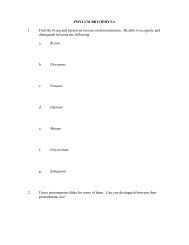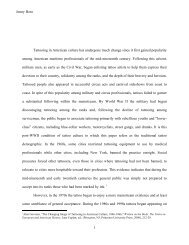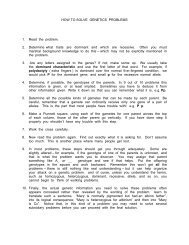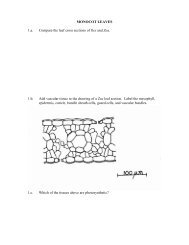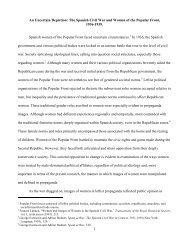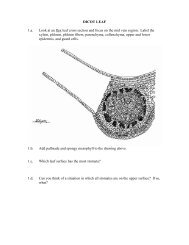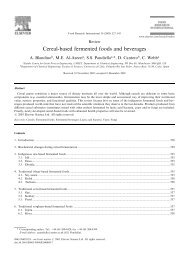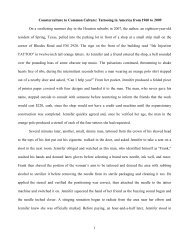<strong>Meat</strong>: <strong>the</strong> challengeTara GarnettEnvironment<strong>Meat</strong> costs <strong>the</strong> climate but mitigation isn’t simpleOur growing world is hungry for meat.According to <strong>the</strong> Food and AgricultureOrganisation (FAO), demand in <strong>the</strong>developing world for meat and milk is set todouble between 2002 and 2030. Populationand per capita demand will rise. The rise in<strong>the</strong> developed world will be more mutedbut starts from a high base. The averageBrit consumes around 44 grams of animalprotein a day, compared with <strong>the</strong> developingworld where consumption is less than halfthat, at 21 grams.1Does this matter, environmentally? Yes,according to <strong>the</strong> FAO. In a major reporton <strong>the</strong> environmental impacts of livestockfarming it states: “The livestock sectoremerges as one of <strong>the</strong> top two or three mostsignificant contributors to <strong>the</strong> most seriousenvironmental problems, at every scale fromglobal to local.”2Livestock’s contribution to climate changeposes particular challenges. In <strong>the</strong> samereport, <strong>the</strong> FAO calculates that livestockaccount for 18 percent of total anthropogenicgreenhouse gas emissions. Cows and sheepburp a lot releasing methane, which has aglobal warming potency 21 times greaterthan CO2. Livestock of all kinds also releasenitrous oxide, 300 times more potent thanCO2. The 18 percent also takes into accountcarbon losses from land or forest clearanceto make way for livestock rearing.The FAO figure is global. The figure is highbecause agriculture is a relatively big playerin <strong>the</strong> economies of many developingcountries. In <strong>the</strong> developed world, where<strong>the</strong>re are greater emissions from transport,manufacturing and domestic energyuse, livestock make a relatively smallercontribution to overall greenhouse gasemissions even though in absolute terms(owing to greater animal numbers) emissionsmay be higher.One EU report draws upon both top-downand bottom-up studies of <strong>the</strong> environmentalimpacts of products consumed in <strong>the</strong>EU, including food.3 On <strong>the</strong> basis ofenvironmental input-output calculations itconcludes that <strong>the</strong> food sector in its entiretyaccounts for up to 31 percent of <strong>the</strong> EU-25’sgreenhouse gas emissions. <strong>Meat</strong> and dairyproducts account for about half of <strong>the</strong>se foodrelated emissions.What about <strong>the</strong> UK? Using published data,it is possible to calculate that our productionof livestock products in <strong>the</strong> UK contributesover six percent to <strong>the</strong> UK’s greenhousegas emissions. When it comes to UKconsumption – taking imports into account– this rises to eight percent.Of course, we also need to take into account<strong>the</strong> emissions that livestock help ‘save.’ Ifwe did not eat meat or drink milk we wouldhave to expend energy and emit greenhousegases to produce substitute foods. Moreover,livestock provide us with lea<strong>the</strong>r, wool,manure (soil fertiliser) and o<strong>the</strong>r animalbasedproducts; without <strong>the</strong>m, we wouldhave to grow or manufacture substituteswhich again require energy to produce andwill inevitably generate greenhouse gases. Itis important to recognise too that livestockcan and do make use of waste food and byproductsthat may be going spare, and grazeon land that cannot not be used productivelyfor any o<strong>the</strong>r form of agriculture. In o<strong>the</strong>rwords, while livestock farming generatesconsiderable volumes of greenhouse gases, itis undoubtedly <strong>the</strong> case that were livestocknot being reared, greenhouse gases wouldstill be emitted as we go about producingsubstitutes for <strong>the</strong> goods that livestockcurrently provide.So, what can we do to reduce greenhousegas emissions from livestock? Variousapproaches are being considered and adopted,largely in <strong>the</strong> developed world. One optionis to modify <strong>the</strong> feed: for example, cattle fedmore cereals and oilseed cake, and fewerfibrous foods such as by-products or poorquality grass, tend to produce less methane.O<strong>the</strong>r approaches include breeding moreproductive animals (such as higher yieldingdairy cows) meaning that fewer animals needto be reared per given quantity of milk ormeat. More effectively managing <strong>the</strong> wasteoutputs of livestock rearing, mainly manure,is <strong>the</strong> focus of fur<strong>the</strong>r activity. Indeed <strong>the</strong>manure can be anaerobically digested, with<strong>the</strong> resulting methane used as a fuel source.However, some measures may havedamaging consequences for animal welfareand raise <strong>the</strong> question of what our ‘ethicalnon-negotiables’ might be. O<strong>the</strong>r measuresmay affect biodiversity. There may be‘second order’ impacts to consider too, withnegative consequences for climate changingemissions. For example, to what extentmight livestock consumption of oilseed cakelead to fur<strong>the</strong>r deforestation to make wayfor, say, soybean plantations?We need to do our thinking with globalpopulation growth in mind. By 2050 <strong>the</strong>global population is projected to top ninebillion. Demand for land, for food and forenergy will grow. If land is used for livestock,however efficiently, it means that <strong>the</strong>rewill be less available to grow o<strong>the</strong>r food orbiofuels. As a result, hungry people may beforced to farm on ever more marginal landswith – among o<strong>the</strong>r things – damagingconsequences for carbon storage.Bearing in mind <strong>the</strong> multiple pressures onland use, global increases in population, <strong>the</strong>importance of o<strong>the</strong>r non-climate-relatedenvironmental issues, <strong>the</strong> ethical obligationto care well for <strong>the</strong> animals we use and <strong>the</strong>limitation of technological-managerialsolutions, a key conclusion we would drawis that if we are serious about tackling foodrelatedgreenhouse gas emissions, we needto consider making significant reductions inour overall production and consumption oflivestock products, while seeking to maximise<strong>the</strong> benefits that livestock can bring.Tara Garnett co-ordinates<strong>the</strong> Food Climate ResearchNetwork (FCRN) at <strong>the</strong>University of Surrey’s Centrefor Environmental Strategy.She has recently published aworking paper for FCRN on<strong>the</strong> climate impacts of <strong>the</strong>meat and dairy sectors.t.garnett@surrey.ac.uk1 100 grams of chicken contains around 30 grams ofprotein.2 Steinfeld, H. et al. (2006) Livestock’s long shadow. FAO.3 EIPRO (2006) Analysis of <strong>the</strong> life cycle environmentalimpacts related to <strong>the</strong> total final consumption of <strong>the</strong>EU25. European Commission Technical Report EUR 22284.08 Winter 2007 | Volume 2 Issue 4 | www.foodethicscouncil.org
How should we farmanimals in 2050?What principles should underpin livestock farming in future? Where shouldwe be in 40 years and how will we get <strong>the</strong>re? We asked some of <strong>the</strong> peoplewho influence how animals are farmed today…The big questionSteven TaitThere will always be consumers who willbuy on price – now and in 2050. But <strong>the</strong>more consumers are informed about animalwelfare and <strong>the</strong> more <strong>the</strong> media continue togive highly effective voice to <strong>the</strong>se concerns,<strong>the</strong> more <strong>the</strong> retail sector will react.This is already happening. The growth in ourown farm animal welfare scheme, FreedomFood, from seven million animals to 160million in four years is just one indicator thatretailer strategies are being increasinglydriven by corporate social responsibility.However, <strong>the</strong> industry will polarise betweenhigh-value, high-quality production,primarily based in this country, and moreintensive systems, primarily based overseas,with cheaper food products imported into<strong>the</strong> UK. Again, this will be driven by retailersresponding to <strong>the</strong> differing demands of <strong>the</strong>ircustomers. In <strong>the</strong> UK, we need to focus onanimal welfare, environment, quality, andprovenance as our differentiators.I hope that <strong>the</strong> welfare standards thatlivestock are reared to overseas will alsoimprove, but it is likely that <strong>the</strong>ir standardswill lag behind those of <strong>the</strong> UK. I doubt thiswill cause more consumers to move awayfrom buying on price alone.Continued improvements in <strong>the</strong> way inwhich we rear our livestock, here or abroad,require food production to be kept at <strong>the</strong>top of consumers’ minds.Transport of live animals is likely to beone of <strong>the</strong> most difficult welfare issues toovercome. It has been driven mainly by <strong>the</strong>closure of small abattoirs and it frustratesattempts to provide locally sourced products.The government must put resources intorebuilding and supporting local abattoirs toalleviate this problem.Matt HoweSustainability may be a buzz word for sometoday, however, as we look towards 2050,it is clear that it will become a part of oureveryday lives and govern many of our dayto-daydecisions.In 2050, McDonald’s will have justcelebrated our 75th anniversary in <strong>the</strong> UK.If Big Macs and milkshakes are to continueas a feature of our menu, it is vital that weassure a sustainable supply chain, and <strong>the</strong>recent changes that we’ve made to ourcoffee offer are a good example of what Imean.All <strong>the</strong> coffee we sell is Rainforest Alliancecertified, served with British organic milk,making it one of <strong>the</strong> most ethical productson <strong>the</strong> high street. As well as deliveringhigh quality beans, <strong>the</strong> Rainforest Allianceaddresses both social and environmentalcriteria in <strong>the</strong>ir certification process. It is thisholistic approach that sets it apart and makesit a sustainable, long term, platform.The foundation of our business is <strong>the</strong> 100percent British and Irish beef in our burgers.It is vital we make <strong>the</strong> same progressivemoves to help establish a sustainable beefsupply chain.So will we see a similar certificationprogramme for beef as we see in coffee?Possibly. What is beyond question is <strong>the</strong>need to develop a foundation for economicand ecological efficiency in conjunctionwith strong animal welfare standards. Ecoefficiency,as defined by <strong>the</strong> World BusinessCouncil for Sustainable Development,addresses many of <strong>the</strong>se aspects.It is this drive for Eco-Efficiency that I believemust underpin <strong>the</strong> beef industry as weapproach 2050.Ken LaughlinThe last 40 years have seen rapid changesin world agriculture.This topic can onlybe addressed by making a series ofassumptions about changes to 2050 whichdefine a new ethos. These are:Animals will continue to be farmed formeat and milk and that fundamentalanimal welfare requirements aresatisfied wherever this occurs.The fallacy of growing edible cropsfor biofuel production will havebeen exposed and will have ceased.In <strong>the</strong> key drivers for meat and milkproduction environmental impact will be amajor component of economic evaluation.Therefore in animal production simplefeed efficiency – food weight in, to saleableyield out – will have been replaced byspecific efficiencies of energy, protein,phosphorous etc. This means that retentionand excretion will be determined, and<strong>the</strong> latter has a major impact on globalwarming potential.Feed and energy-intensive meat and milkproduction will have been relocated toclimatically suitable areas of <strong>the</strong> globecloser to <strong>the</strong> main grain and proteinmeal producing regions. These regionsalso require less use of primary energy inhusbandry systems in order to maintain<strong>the</strong> health and welfare of <strong>the</strong> animals.Thus food production will be drivenby <strong>the</strong> need to feed people efficiently.Fundamentally inefficient productionsystems which may give a small minorityof consumers a ‘feel good’ factor willhave been eclipsed by a global productionsystem that addresses <strong>the</strong> broader ethos ofsustainable food production for all peopleacross <strong>the</strong> whole planet.Steven Tait is Head of Sales and Marketingat <strong>the</strong> RSPCA / Freedom Food Ltd.www.rspca.org.ukMatt Howe is Senior Vice President ChiefSupport Officer at McDonald’s Restaurants UK.www.mcdonalds.co.ukDr Ken Laughlin is Vice President of Policy and Strategyfor Aviagen, which breeds poultry. He has providedtechnical advice to poultry farmersin all regions of <strong>the</strong> worldwww.aviagen.www.foodethicscouncil.org | Volume 2 Issue 4 | Winter 2007 09



